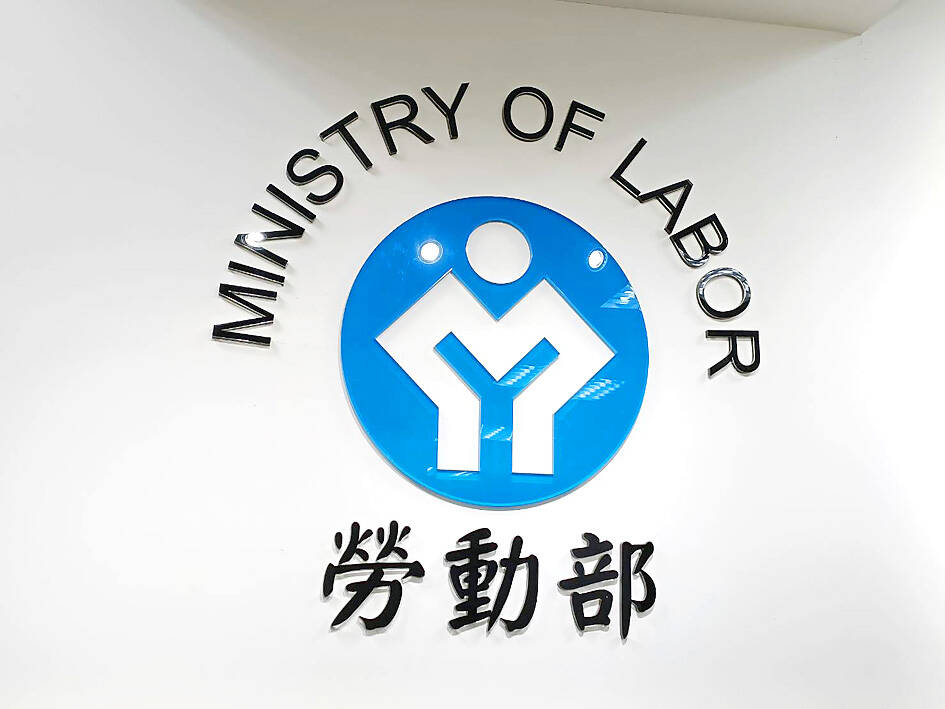To address workforce shortages, revised regulations from yesterday allow companies in manufacturing, construction, agriculture and long-term care industries to hire more migrant workers, the Ministry of Labor said.
The number of migrant workers a company can hire in the seafood processing, tofu producing and shipbuilding industries increased from 15 percent to 20 percent of total employees, the ministry said, adding that the sectors are labor-intensive and cannot be automated.
The employment ratio can rise to up to 40 percent if the companies pay the government-run Employment Security Fund an employment security fee for every migrant worker hired, it said.

Photo: Lee Chin-hui, Taipei Times
The fund was established to improve labor welfare and handle employment and management affairs involving foreign nationals, it said.
To encourage the hiring of migrant workers already in Taiwan who might have lost their job, businesses in the manufacturing sector can apply for an additional flexible allocation that would allow migrant workers to make up a further 5 percent of a company’s workforce.
To access this additional allocation, employers would need confirmation from the Ministry of Economic Affairs’ Industry Development Bureau and proof of job openings from public employment services agencies, it said, adding that an employment security fee of NT$2,000 per month for each foreign worker is required.
The number of migrant workers employed per company categorized as a “dirty, dangerous and demanding” industry must not exceed 40 percent of the total workforce, the ministry said.
Private construction companies previously could not employ migrant workers, but the new rules allow them to hire up to 8,000 migrant workers, with the potential to raise the quota to 15,000, the ministry’s Workforce Development Agency said.
Grade A, B and C construction companies, specialized construction firms and civil engineering companies that have fulfilled certain criteria in the past three years can hire migrant workers for up 30 percent of their workforces, it said.
Such companies can increase the ratio to 40 percent by paying the extra employment security fee, it added.
The quota for migrant workers in companies in the agricultural sector has doubled from 6,000 to 12,000, the ministry said, adding that the hiring ratio of local to migrant workers was raised to 1:1 for farming businesses with fewer than 10 employees.
For companies with 10 employees or more, migrant workers are limited to 35 percent of the total workforce, the ministry said.
Employers can increase the proportion to 40 percent by paying the extra employment security fee, it said.
The hiring ratio in social welfare institutions and long-term care facilities is based on licensed bed capacity, rather than the number of residents or available beds, the agency said.
The hiring ratio for social welfare institutions is one migrant worker for every three licensed beds, it said, while the ratio for long-term care facilities is one migrant worker for every five licensed beds.

Alain Robert, known as the "French Spider-Man," praised Alex Honnold as exceptionally well-prepared after the US climber completed a free solo ascent of Taipei 101 yesterday. Robert said Honnold's ascent of the 508m-tall skyscraper in just more than one-and-a-half hours without using safety ropes or equipment was a remarkable achievement. "This is my life," he said in an interview conducted in French, adding that he liked the feeling of being "on the edge of danger." The 63-year-old Frenchman climbed Taipei 101 using ropes in December 2004, taking about four hours to reach the top. On a one-to-10 scale of difficulty, Robert said Taipei 101

Nipah virus infection is to be officially listed as a category 5 notifiable infectious disease in Taiwan in March, while clinical treatment guidelines are being formulated, the Centers for Disease Control (CDC) said yesterday. With Nipah infections being reported in other countries and considering its relatively high fatality rate, the centers on Jan. 16 announced that it would be listed as a notifiable infectious disease to bolster the nation’s systematic early warning system and increase public awareness, the CDC said. Bangladesh reported four fatal cases last year in separate districts, with three linked to raw date palm sap consumption, CDC Epidemic Intelligence

Two Taiwanese prosecutors were questioned by Chinese security personnel at their hotel during a trip to China’s Henan Province this month, the Mainland Affairs Council (MAC) said yesterday. The officers had personal information on the prosecutors, including “when they were assigned to their posts, their work locations and job titles,” MAC Deputy Minister and spokesman Liang Wen-chieh (梁文傑) said. On top of asking about their agencies and positions, the officers also questioned the prosecutors about the Cross-Strait Joint Crime-Fighting and Judicial Mutual Assistance Agreement, a pact that serves as the framework for Taiwan-China cooperation on combating crime and providing judicial assistance, Liang

US climber Alex Honnold left Taiwan this morning a day after completing a free-solo ascent of Taipei 101, a feat that drew cheers from onlookers and gained widespread international attention. Honnold yesterday scaled the 101-story skyscraper without a rope or safety harness. The climb — the highest urban free-solo ascent ever attempted — took just more than 90 minutes and was streamed live on Netflix. It was covered by major international news outlets including CNN, the New York Times, the Guardian and the Wall Street Journal. As Honnold prepared to leave Taiwan today, he attracted a crowd when he and his wife, Sanni,